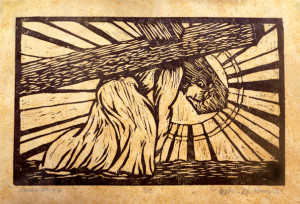One of the most profound, yet confusing passages in the writings of the prophets is from the book of Isaiah, chapter 53, verses 4-6.
Isaiah 53:4-6
4 Surely he took up our pain
and bore our suffering,
yet we considered him punished by God,
stricken by him, and afflicted.
5 But he was pierced for our transgressions,
he was crushed for our iniquities;
the punishment that brought us peace was on him,
and by his wounds we are healed.
6 We all, like sheep, have gone astray,
each of us has turned to our own way;
and the LORD has laid on him
the iniquity of us all.
– New International Version (NIV)
I understand that Christ took our punishment on the Cross for our sins. I also understand that there is a wisdom that comes with woundedness and scarring. Henri Nouwen imparts that each of us is a wounded healer in some way, on one level or another. He goes on to speak of our woundedness and our recovery as what makes us authentic in ministry to our friends, our neighbors, the stranger and the enemy.
Our own experience with loneliness, depression, and fear can become a gift for others, especially when we have received good care. As long as our wounds are open and bleeding, we scare others away. But after someone has carefully tended to our wounds, they no longer frighten us or others.
When we experience the healing presence of another person, we can discover our own gifts of healing. Then our wounds allow us to enter into a deep solidarity with our wounded brothers and sisters.To enter into solidarity with a suffering person does not mean that we have to talk with that person about our own suffering. Speaking about our own pain is seldom helpful for someone who is in pain. A wounded healer is someone who can listen to a person in pain without having to speak about his or her own wounds. When we have lived through a painful depression, we can listen with great attentiveness and love to a depressed friend without mentioning our experience. Mostly it is better not to direct a suffering person’s attention to ourselves. We have to trust that our own bandaged wounds will allow us to listen to others with our whole beings. That is healing.”
-Henri Nouwen, The Wounded Healer, 1979
Who better to love and support the alcoholic than the recovering alcoholic? Who better to enter into the pain of another’s heartbrokenness than one who has been there and done that?
I found that my father’s death has been more than I could bear at times. But in each of those dark moments, I reached out to someone who had lost their father as well. My biological sister and my brother have been healers to me — sometimes, without even knowing it. But that is not to shortchange those who had more experience with that particular type of loss than I or my siblings. I remember one colleague who shared the difficulty of the seventh year after the loss of his mother while I was yet in the second year of my loss. When year seven came to me, I was somewhat prepared by his sharing. And I’ve kept that in mind as I shared with others.
In days past, I have called you to consider your addictions, your hurts. I’ve asked you to reflect upon your bad habits and your harbored hatred. One of the reasons I’ve asked this of you is to call you into deeper relationship with Christ. By reflecting on those negative places in our lives, we have the opportunity to bring them before Christ. Too often, we suffer without thinking. We ached without reflecting. But when the pain of our moments is considered, there is a chance, at long last, to bring those pains before the throne of Christ. And in that moment, we are forced to realize the defilement that those awkward sins and long-held-hurts are bringing to our existence.
In the presence of Christ, our sins stand out for what they are. No longer can we fool ourselves into believing that we are right to hold the grudge. Gone is the justification for hatred. And how quickly departs the rationalization for the addictions and selfishness we embrace.
But then comes the moment that offers us renewed purpose. Most of us have been conducted into the presence of Christ by one who was, in turn, shown the way home.
Now it is our turn. Because of the authenticity of your experiences, you can be trusted. Your experience provides wisdom. Your experiences offer a knowledge that cannot be had on the other side of the pain. But, more importantly, our healed wounds give us a sense of authenticity. This is the greatest gift of all the products of healing. You can become living proof that the suffering is finite, the pain is temporary, and the hope that we offer is real.
Make no mistake: Jesus is the healer. But you can provide the conduit.
T. S. Eliot says it better with verse (T. S. Eliot, The Complete Poems and Plays, London 1985, p. 181):
The wounded surgeon plies the steel
That questions the distempered part;
beneath the bleeding hands we feel
The sharp compassion of the healer’s art.
Who are the people in your life that are walking the path of brokenness where once you yourself walked?













Recent Comments